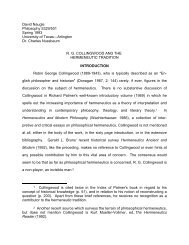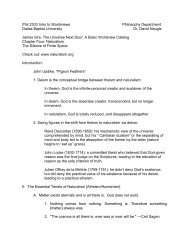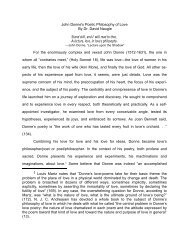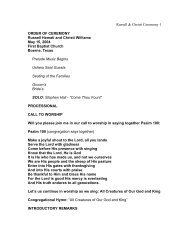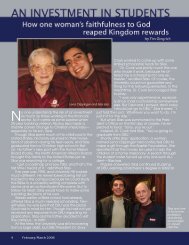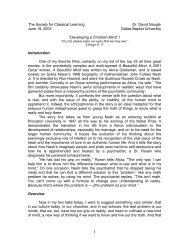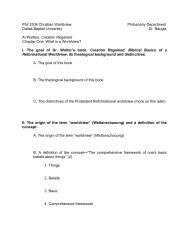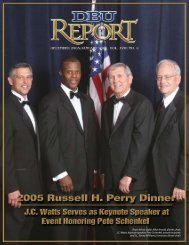A Bad Set of Fellows
A Bad Set of Fellows
A Bad Set of Fellows
Create successful ePaper yourself
Turn your PDF publications into a flip-book with our unique Google optimized e-Paper software.
passions in any way they [have] in their power” (quoted in Pinchbeck and Hewitt 351).<br />
Nineteenth-century evangelicals <strong>of</strong>ten inherited Wesley’s views, as did the state. Early in<br />
Dickens’ lifetime, it was not at all unusual for children to be imprisoned and executed, in<br />
fact.<br />
During the decade <strong>of</strong> Great Expectations, however, reform was indeed taking<br />
place. In particular, working class parents who had sent their children to work twelvehour<br />
days in the small spaces <strong>of</strong> the mines and chimneys found that Parliament was<br />
responding to reports that claimed “Amongst no persons do the children <strong>of</strong> both sexes<br />
need so much protection as against their parents” (Pinchbeck and Hewitt 355). 2<br />
At the heart <strong>of</strong> the debate now was the question <strong>of</strong> whether parents had absolute<br />
responsibilities and rights, and the family was to be preserved at all costs; or if the state<br />
had the responsibility <strong>of</strong> caring for children, even if it meant undermining the principle <strong>of</strong><br />
parental responsibility for the feeding and care <strong>of</strong> children (Pinchbeck and Hewitt 358).<br />
When an older sister, Jane, seeks to protect Baby Pocket from pretentious Mrs. Pocket’s<br />
inattention to its playing with a dangerous nutcracker, Dickens comically satirizes this<br />
societal debate through Mr. Pocket’s exasperated cries:<br />
“Belinda,” remonstrated Mr. Pocket. . . . “Jane only interfered for the<br />
protection <strong>of</strong> baby.”<br />
“I will not allow anybody to interfere,” said Mrs. Pocket. “I am surprised,<br />
Matthew, that you should expose me to the affront <strong>of</strong> interference.”<br />
“Good God!” cried Mr. Pocket, in an outbreak <strong>of</strong> desolate desperation.<br />
“Are infants to be nutcrackered into their tombs, and is nobody to save<br />
them?”<br />
“I will not be interfered with by Jane,” said Mrs. Pocket. . . . “I hope I<br />
know my poor grandpa’s position. Jane, indeed!”<br />
. . . “Hear this!” [Mr. Pocket] helplessly exclaimed to the elements.<br />
“Babies are to be nutcrackered dead for people’s poor grandpapa’s<br />
positions!” (180)<br />
Thus, not only did religious attitudes negatively affect the welfare <strong>of</strong> children, but<br />
the stubborn philosophy <strong>of</strong> absolute parental rights did so as well. In this passage we also<br />
see that within the family, Mr. Pocket submits to the authority <strong>of</strong> his wife, as does Joe<br />
Gargery in his household. This submission <strong>of</strong> husband to wife when the children’s<br />
welfare is at stake is puzzling in an age where fathers’ rights were paramount over the<br />
mothers’. The neglect <strong>of</strong> the Pocket children and the abuse <strong>of</strong> Pip by his maternal<br />
guardian are exacerbated by the spinelessness <strong>of</strong> the paternal authorities who by law<br />
actually had the power to protect. However, in truth, paternal rights were generally<br />
fleshed out in terms <strong>of</strong> ownership rather than in nurturing. In this context, Dickens seems<br />
to be asking, “Is nobody to save them?”<br />
The Victorian response to children was, as mentioned before, influenced by the<br />
intellectual tradition <strong>of</strong> John Wesley, whose Calvinist philosophy held that because <strong>of</strong><br />
original sin, children had an incapacity for good. Countering that view was Rousseau’s,<br />
that they were essentially innocent and had an incapacity for evil. Rousseau also believed<br />
in bringing up children not as little adults but rather in line with their natural development<br />
(Grylls 23-33). Victorians seemed to take to extremes <strong>of</strong> both views, with Dickens more<br />
in line with Rousseau’s than with Wesley’s.<br />
2



